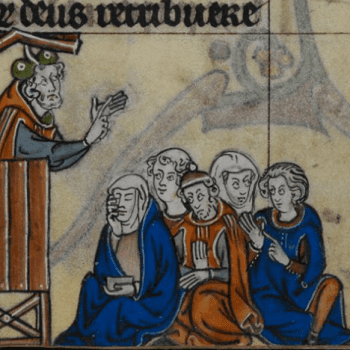A friend of mine was preparing his sermon. We happened to be at the same social function, and so he casually asked me what I knew about medieval illuminations (i.e. fireworks). To be honest, I didn’t know much. From my years of teaching world history I knew that gunpowder and fireworks had originated in Asia and spread rather slowly (along trade routes and through military ventures) to Europe. Hence European fireworks are really an early modern/modern phenomenon.
My friend’s question, however, was fairly specific: when was the earliest use of fireworks for a royal event in England? This was beyond my general knowledge.
I wasn’t worried. I knew I could quickly find the answer. So I did, and told my friend what he needed the next day (late fifteenth century, for those of you interested).
I am a professional historian. But the methods I employed to help my friend are not monopolized by my profession. Most of the tools pastors need for basic yet reliable historical research are readily available in our digital age. So, for those of you who like to “do-it-yourself”, here is a quick guide to becoming (at least for the basic stuff) your own personal historian:
1. How to Critically Evaluate Websites (the same principles can be applied to evaluating books and articles):
I would bet that the internet search browser is your first line of research offense. This is fine–as long as you evaluate the search results critically. Ask three questions before using information from a website.
First,who sponsors the website and/or who are the authors? Is it based at a university (with academics contributing to it), written by a respected news organization (such as the BBC, Smithsonian, National Geographic, US News & World Report, Christianity Today, etc.), or is it sponsored by a particular religious organization and/or person? Please don’t get me wrong– a news site may be just as reliable/unreliable as a personal blog. What you are attempting to do is figure out who is providing the information and why. Is it research funded by a university or research endowment and subjected to peer review (which means it has been been vetted by experienced authorities)? Does a contributing author have credentials/expertise in the area about which she is claiming knowledge (credible degrees, background experience, employment, etc.,)? Check out the ‘About,’ ‘About Us,’ ‘History,’ ‘Mission,’ and/or ‘Author’ button on the website and learn about who is sponsoring and writing the information before you use it. This simple step would have prevented lots of embarrassing mistakes made from folk quoting “The Onion” as a reputable news site. Indeed, just reading the “About Us” page under the menu bar on “The Onion” makes it clear that the the news source is a satire, even if you miss their Latin motto “Tu Stultus Es” (“You are a Fool”).
Second, does the article/website cite sources? This is critical. I would strongly encourage you never to use information from an online source that does not tell you where it got the information (and in a way that you can look it up). For example, in my last blog (1647: The Year Christians Cancelled Christmas) I explained that I was drawing from an expertly researched book on the English Civil War by historian Diane Purkiss. Any reader can find her book and check my story. The exception to this would be a source written by a credentialed expert in the field (although usually experts still will provide some indication about their source material).
Third, have you checked out the cited sources? Don’t make yourself look stupid by repeating bad information. Wikipedia cites sources, and Wikipedia articles have errors (see this comparison of Wikipedia articles with peer reviewed medical research). In other words, even articles/websites that cite sources sometimes use them incorrectly, draw from disreputable places, or simply omit relevant data. Don’t stake your reputation on an unexamined claim. Follow the trail and check out the source for yourself.
2. How to Effectively Check Sources:
So how do you check out sources? I would start with google books (simply type in google books to your internet search browser). Google Books is a fabulous resource. It is part of a larger project which aims to digitize and make word-searchable books within academic libraries. The entire content of each book is scanned and available for searching (even if not always available for reading), which means you can do quick checks to verify information. Take for example my search for the first use of fireworks at a royal event in England. My first broad google search was simply “medieval England fireworks,” which led me to several websites mentioning the marriage of Henry VII. I went to google books and typed in “Henry VII” and “fireworks.” This produced only spotty references to a marriage procession with something called the “Bachelor’s Barge”. I began a new search in google books, this time with “Henry VII” and “Bachelor’s Barge.” I quickly found an entry in the Oxford Dictionary of National Biography ( a reputable source) describing how the marriage procession for Elizabeth of York contained a mock fire-breathing dragon (the fireworks) on one of the boats (the Bachelor’s Barge). Now I could be pretty certain that a limited fireworks display occurred in 1487 as part of the marriage celebration for Henry VII.
Of course, I already knew that the Oxford Dictionary of National Biography was a reputable source. How can you have the same certainty that other secondary sources are equally reliable? Check the author (are they qualified? do they have the credentials/education/expertise in their claimed area of expertise?); check the publisher (is it an academic press, which means that the research has been submitted to expert scholars in the field for their review and recommendation before publication–like Oxford, Yale, or Harvard; a trade academic press (ditto the peer review process)–like Boydell, Brill, or Routledge; a trade press that publishes scholarly texts (which means editorial board review and sometimes peer review); check the date (is it relatively recent? or has it been superseded by more up-to-date research?); and check to make sure it cites sources (is there a bibliography, parenthetical citations, or footnotes/endnotes?).
3. How to Check Your Own Bias:
Finally, make sure you understand why certain websites/online articles (and this applies to print books, articles, and news sites as well) attract you. We prefer to read information that supports our established beliefs (this is called confirmation bias). But just because you really like the moral teachings of Focus on the Family doesn’t mean that it should be your go-to-resource for historical, cultural and even medical information. You should ask the same question of information presented at your favorite news and Christian sites as you would of other sites: does the author have the credentials to write about this topic; has the research/argument been recognized as reliable by other authorities (peer-review); does the author leave a trail of sources that can be checked to verify the claims? Remember, you are using information to convince your audience and teach spiritual truths. If you are using sketchy information from unverifiable sources, it doesn’t matter if your favorite Christian writer said it; what matters is that your audience might check your claims and find you unreliable.
Taking time to do a little extra research is worth it. It makes our arguments more powerful as they are based on convincing and reliable research. It makes us less likely to make stupid mistakes. And it helps us, as teachers representing Christianity, uphold the heavy responsibility found in Titus 2:7-8. “In your teaching show integrity, dignity, and a sound message that cannot be criticized, so that any opponent will be at a loss, because he has nothing evil to say about us.”












